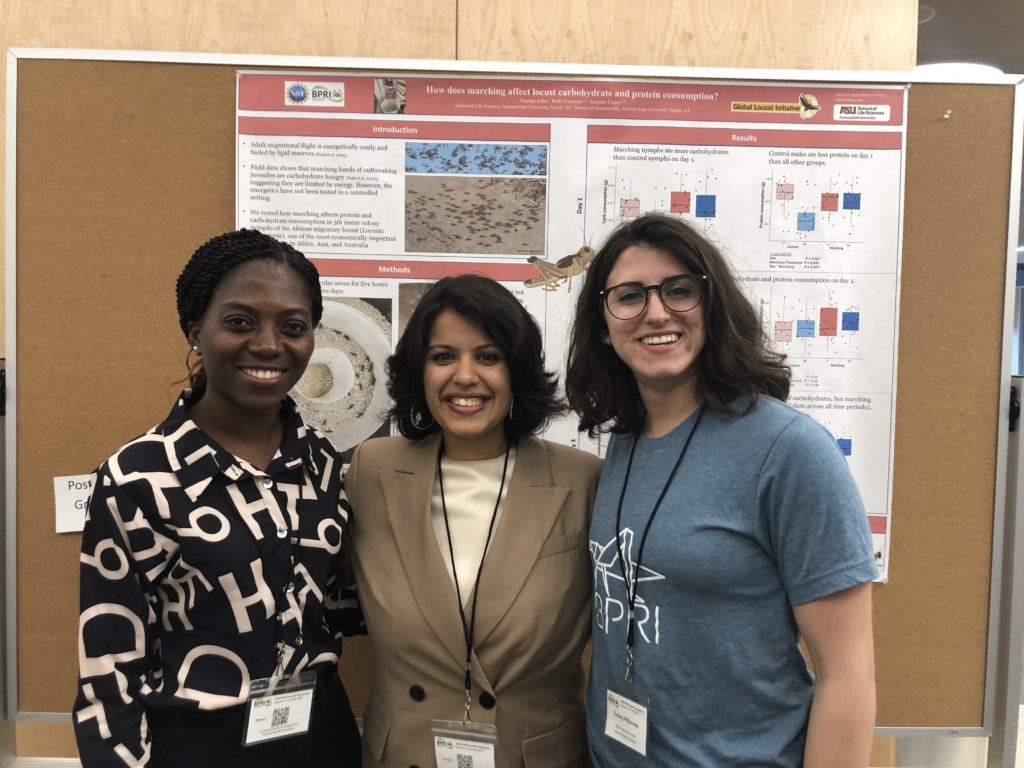By Mira Ries
The 2023 Symposium on Behavioral Plasticity was hosted by the talented students of the Behavioral Plasticity Research Institute (BPRI) on May 15th and 16th 2023 at the Baylor College of Medicine.
Attendees had the opportunity to hear from a series of excellent speakers who shared their research on behavioral plasticity, a field that examines the capacity of organisms to adapt and modify their behavior in response to environmental stimuli. The symposium was primarily attended by BPRI members from the core institutions —Arizona State University, Texas A&M University, Baylor College of Medicine, Southern Illinois University Edwardsville, Washington University in St. Louis, and the USDA ARS— “friends of BPRI”, were also able to attend and share about their experiences working on plasticity in systems outside of locusts.
The keynote speakers showcased examples of plasticity through the lens of genomics, epigenomics, transcriptomics, neurophysiology, behavior, ecology, microbiology, and evolutionary biology. On the first day, Jennifer Brisson of Rochester University presented her work on the molecular mechanisms that underlie aphid wing plasticity, in which genetically identical winged or wingless morphs are produced in response to a high or low-density maternal environment. Michele Clark from Arizona State University spoke on the important topic of mentorship and how the mentoring relationship can be a mutually enriching and valuable partnership for both parties. Jon Harrison also from Arizona State University, concluded the keynote speakers with his talk on how bees respond to two potential anthropogenic environmental threats, climatic warming and fungicide exposure.
On the second day, David Pfennig joined us virtually from the University of North Carolina Chapel Hill for his talk on how phenotypic plasticity fits into evolutionary theory. He used data from diverse natural systems to illustrate key features of phenotypic plasticity, discuss how it evolves, and explore its impacts on evolution. Cheryl Walker from Baylor College of Medicine presented about how epigenetic programming is heritable once installed, yet retains intrinsic plasticity. Paul Rainey, of Texas A&M University spoke to the trainees about how to pursue a diversity of careers in both academic and non-academic settings while the BPRI principle investigators and staff discussed future pathways for the BPRI.
In addition to the keynote speakers, the symposium offered student poster sessions and short oral presentations by students and senior researchers. The student posters covered a variety of topics ranging from genetics to population dynamics, nutrition, olfactory systems and more. Arizona State University PhD students from the Global Locust Initiative Laboratory, Neema John and Mehreen Tahir, presented posters on how marching affects locust carbohydrate and protein consumption and the effect of a macronutrient consumption on susceptibility to pathogen infection in the desert locust, respectively. Sydney Millerwise received the top oral presentation award for her talk titled “Lifespans and lifetime reproductive performance affected by dietary macronutrient balance”.
The symposium facilitated networking opportunities, enabling attendees to establish connections with fellow researchers and experts in the field. The exchange of ideas and perspectives during informal discussions and social events helped foster collaborations and inspire new avenues of research.
Overall, the 2023 Symposium on Behavioral Plasticity helped participants continue to bridge gaps between various scientific disciplines and advance our understanding of behavioral plasticity and its profound implications for the natural world and human society.


